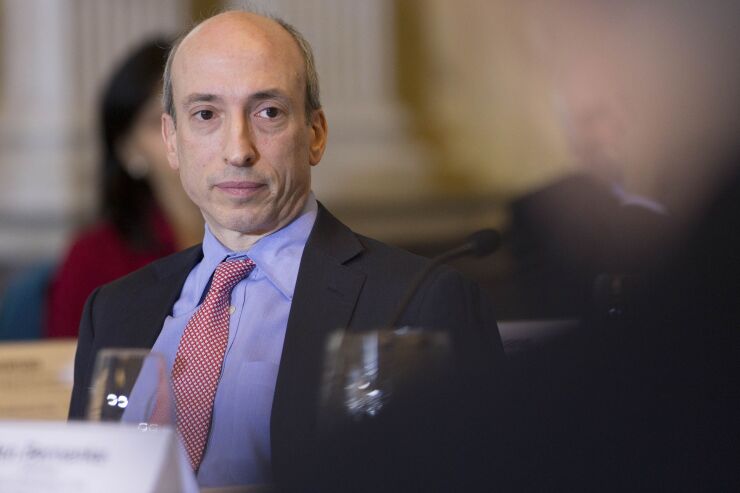SEC Chair Gary Gensler has assigned his team the difficult task of assessing how data analytics are used by an industry already concerned about regulatory overreach.
In a virtual session at the annual meeting of the Securities Industry and Financial Markets Association, Gensler pointed out that members of the trade group representing brokerages, investment banks and asset managers have deployed “a lot of new predictive data analytics, machine learning and deep learning models” in speaking to clients and prospects.
The regulator is studying how and when the technology adds up to a formal recommendation.
The process is “a project that we have ongoing around robo advising, investment advising and also in brokerage, to the extent that they're using data analytics to market to you differently than they market to somebody else,” Gensler said when asked to name the most important priorities for the SEC in light of the
“So when is something a recommendation?” he asked. “Some [of those firms] don't take it, but [for] those that do, there's an inherent conflict. And they could be steering the retail public to trade more often or steering the retail public into margin accounts or options trading, which may not be in that individual investor’s best interest. So we're really trying to take a look at this, because new technologies are challenging old concepts.”
While financial giants would naturally welcome greater scrutiny of their startup competitors in retail wealth management, the SEC would likely encounter industry resistance if any new guidelines move fully in the direction advocated by Gensler on topics such as analytics, ESG data and payment for order flow.
For example, Charles Schwab CEO Walt Bettinger, speaking on his own panel after Gensler’s remarks, compared the idea of prohibiting payment for order flow to pushing water from one part of balloon to another since “you're just transferring that economic value to somewhere else, the economic value doesn't magically disappear,” Bettinger said. Schwab clients have received $6.50 in lower prices for every $1 the firm has received through payment for order flow in 2021, according to Bettinger.
Still, Bettinger said that he has publicly called, as far back as five or six years ago, for investors’ trade confirmations to include the amount of order flow payments in the transactions.
“We just have to make sure that any changes that are made to market structure are really carefully assessed,” he said. “We don't want to reduce competition. We don't want to have a regulation that dictates winners based on philosophical differences or even the risk of political viewpoints.”
Schwab and other large financial firms are taking small steps in Gensler’s direction even as they warn against the potential impact of tougher regulations on innovation and business growth.
With the Biden administration’s political opponents criticizing Gensler’s calls for greater disclosure of climate risk and workforce demographics on those grounds, he has countered that shareholders are increasingly interested in sustainable investing. On the same day as the SIFMA conference, Schwab Asset Management and sub-advisor Ariel Investments announced the
With its first day of trading slated for Nov. 16, the Schwab Ariel ESG ETF will target small- and mid-cap equities that pass through screens excluding tobacco products, fossil fuels, private prisons, firearms or other weaponry. The semi-transparent ETF carries an operating expense ratio of 59 basis points,
Schwab and Ariel, the first African American-owned money manager — John Rogers founded the firm in 1983 — have been working together for 20 years on an annual survey of Black investors. The fund represents the first Schwab fund sub-advised by Rogers’ firm.
“We are delighted to expand our long-standing relationship with Schwab and bring our value-based, high-conviction ESG approach to the market in this new ETF,” Rogers said in a statement. “We believe in a more rigorous and thoughtful approach to ESG investing that uses proprietary analysis to gain a nuanced view of ESG risk, instead of relying solely on third-party rating systems. As long-term investors, we are driven by dialogue, not dictates.”








